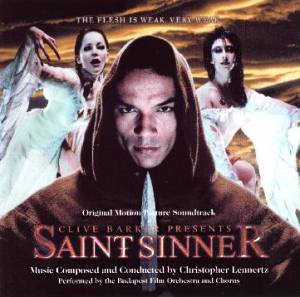Christopher LENNERTZ
Saint Sinner
OST; Performed by the Budapest Film Orchestra and Chorus
PROMO ALBUM http://www.christopherlennertz.com [46:32]

Christopher Lennertz delivers a powerful score for this new shocker from Clive Barker (Hellraiser and Candyman etc) about two devilishly seductive beautiful women being released from an ancient statue to wreak havoc. Lennertz is served well by the Hungarian orchestral players and chorus. His score is basically derivative influenced by Danny Elfman and Christopher Young but mainly by John Williams (especially Close Encounters…) and Jerry Goldsmith (The Omen). Much of the score is based on Latin liturgical music. The engaging opening Benedictus/ Main Titles is a serenely meditative women's chorus, but with an underlying threatening charge. Agnus Dei is another attractive track and evidence of Lennertz's skill, the influences of Fauré and Verdi are apparent. The growing threat is apparent and further choral tracks (like 'Kyrie/Naraka') reveal a corruption of its purity. The hero Tomas, has a noble solemn theme; piety under threat. Unusually the album concludes with the Main Theme reprised for string quartet.
The remainder of the score has all the creepy, slithering, clanging, explosive figures we have heard so many times before but with sufficient imagination and terrifying ingenuity to keep the ear interested if not deafened.
Lennertz is certainly an interesting voice – one I will personally look out for in future.
Ian Lace

Paul Tonks adds:
This score has been rather dismissively pigeon-holed alongside Christopher Young's Hellbound. The genre and the Clive Barker connection notwithstanding, it's a shame that anything in the world of horror that sees fit to utilise chorus should be so readily lumped in The Omen vein. If any connections to Young's magnum opus deserve to be made, it ought to be with a view to comparing the possibility that both are breakout projects leading to greater things.
This is a TV movie I'm not likely to see (being in the UK), but it's easy to cobble together the gist of what this is about. Knowing that is 'only' a TV movie does give cause for celebration that at least somewhere there are producers acknowledging the importance of a budget that supports an orchestral score. More than that, this is a rich work full of choral passages. This is credited to the Budapest Film Orchestra and Chorus, but I don't care what anyone may say about saving costs by overseas recordings – someone got there money's worth.
Strong themes vie for the listener's attention in between some dark and dissonant writing. As the composer himself has said, this is basically the intent in throwing some clashing styles together knowing that they all gel in the end (in the "Saint Sinner Quartet" reprise).
This is a limited edition, so the best way of tracking it down is from the record label website.
Paul Tonks

Return to Index